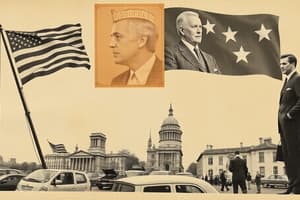Podcast
Questions and Answers
কোনটি সঠিক যা প্রাচীন উদারবাদ এর বৈশিষ্ট্য হিসেবে চিহ্নিত করা হয়?
কোনটি সঠিক যা প্রাচীন উদারবাদ এর বৈশিষ্ট্য হিসেবে চিহ্নিত করা হয়?
- ব্যক্তিগত স্বাধীনতা ও অর্থনৈতিক নির্ব interference পেয়ে
- সামাজিক ভালবাসার সাথে সংযুক্ত একটি commit এর সাথে
- মূলত মহিলাদের অধিকারগুলির importance emphasis
- বিনিয়োগের ক্ষেত্রে সর্বোচ্চ interference পেয়ে (correct)
নিউ-লিবারেলিজমের কোনটির emphasis এর importance বৃদ্ধি?
নিউ-লিবারেলিজমের কোনটির emphasis এর importance বৃদ্ধি?
- শাসনের deregulation-er need
- নিঃশুল্ক বাজারের importance
- globalization-er importance (correct)
- individual freedom-er importance
নিউ-লিবারেলিজমের influence-er associated figure-er combination কি?
নিউ-লিবারেলিজমের influence-er associated figure-er combination কি?
- Milton Friedman and Adam Smith
- John Maynard Keynes and Tony Blair
- Friedrich Hayek and John Maynard Keynes
- Friedrich Hayek and Margaret Thatcher (correct)
উদারবাদের criticisms-er মধ্যে কোন criticism-er important emphasis?
উদারবাদের criticisms-er মধ্যে কোন criticism-er important emphasis?
নিউ-লিবারেলিজমের challenges-er influence important criticism-er failure-er cause?
নিউ-লিবারেলিজমের challenges-er influence important criticism-er failure-er cause?
Flashcards are hidden until you start studying
Study Notes
Political Theory: Understanding Liberalism
Political theory is the academic study of politics, which encompasses several subfields, including liberalism. Liberalism is a widely held set of political beliefs that emphasizes individual freedom, equality, and the rule of law. It is rooted in the idea that reasonable people can put aside their disagreements and cooperate in the public sphere to address shared problems. This article provides an overview of liberalism, its key principles, and its various forms.
Key Principles of Liberalism
Liberalism is characterized by several key principles:
-
Individual freedom: Liberals believe in the freedom of individuals to make their own choices and live their own lives, as long as they do not harm others.
-
Equality: Liberals advocate for equal rights and opportunities for all individuals, regardless of their background.
-
Rule of law: Liberals believe in the importance of a legal system that is impartial, consistent, and applies to everyone equally.
-
Separation of powers: Liberals support the separation of powers within a government, which helps to check and balance the actions of different branches or levels of government.
-
Democracy: Liberals believe in the importance of representative democracy, where citizens have the power to elect their leaders and hold them accountable.
-
Peaceful change: Liberals promote peaceful and non-violent methods for bringing about social and political change.
Forms of Liberalism
Over time, several forms of liberalism have emerged, each with their distinct characteristics and emphases:
-
Classical liberalism: This form of liberalism, also known as "economic liberalism" or "market liberalism," emphasizes individual freedom and limited government intervention in economic affairs. It originated in the 18th and 19th centuries and has been associated with figures such as Adam Smith and Milton Friedman.
-
Social liberalism: Social liberalism, also known as "social democracy" or "social-market economy," combines elements of classical liberalism with a commitment to social welfare and government intervention in the economy. It has been associated with figures such as John Maynard Keynes and Tony Blair.
-
Neoliberalism: This form of liberalism emerged in the mid-20th century and emphasizes the importance of free markets, deregulation, and globalization. It has been associated with figures such as Friedrich Hayek and Margaret Thatcher.
-
Feminist liberalism: Feminist liberalism emphasizes the importance of gender equality and women's rights within the context of liberal political theory. It has been influenced by the work of figures such as Carole Pateman and Anne Phillips.
Criticisms of Liberalism
Despite its widespread influence, liberalism has also faced criticisms and challenges:
-
Lack of social cohesion: Critics argue that liberalism's focus on individual freedom and equality can lead to a lack of social cohesion and a failure to address broader social problems.
-
Limits of democracy: Some critics argue that liberal democracy can be undermined by the influence of money and powerful interests, leading to an unequal distribution of political power.
-
Globalization: Critics of liberalism also argue that the spread of neoliberalism and globalization has led to the erosion of national sovereignty and the concentration of economic power in the hands of a few corporations and elites.
Conclusion
Liberalism is a complex and multifaceted political theory that has evolved over time and taken various forms. It is characterized by its emphasis on individual freedom, equality, rule of law, and democratic decision-making processes. Despite its widespread influence, liberalism also faces criticisms and challenges, particularly in terms of social cohesion, the limits of democracy, and the effects of globalization. As political theory continues to evolve, liberalism will likely continue to be a central and influential force in the study and practice of politics.
Studying That Suits You
Use AI to generate personalized quizzes and flashcards to suit your learning preferences.




